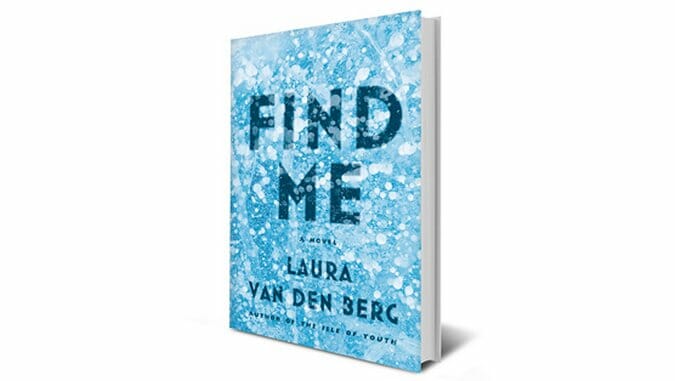Find Me by Laura van den Berg
Hug your loved ones tighter. Savor sunshine.

One hundred pages into Laura van den Berg’s melancholy and unpredictable debut novel, Find Me, narrator Joy Jones dons a vampire mask, looks at herself in the bathroom mirror and says, “Pleased to meet you.” The moment is a non-sequitur, a rootless gesture from a rootless young woman, but it is emblematic of the ways van den Berg’s characters experience the self as an inscrutable Other. “Who” is often the motivating question in her work and her plots catch characters in the act of reconsidering their identities. When Joy gazes at her masked face, observing herself as alien, she hopes the disguise will reveal something previously hidden about who she is.
At the start of the novel, we learn that the U.S. has been upended by fear and uncertainty following the outbreak of a “micro epidemic” that deprives victims of their memories, leading to neurological collapse and death. Nineteen-year-old Joy has agreed to leave her native Boston and enter a research hospital in Kansas after learning she is immune to the sickness. There, in the Hospital—“Hospital” is always capitalized, and if, like me, you assume this implies a Theme, your assumptions will be Frustrated—Joy and other patients suspected of immunity are studied, they are told, so the disease might be better understood and eradicated.
The Hospital is overseen by Dr. Bek, an implacable Norwegian who maintains a breezy order with the help of nurses in hazmat suits. Patients are not allowed to leave or roam freely; harsh winter weather threatens the lives of anyone attempting an escape on foot. Joy is docile at first, both because she is afraid of catching the sickness and because her itinerant life as an orphan has habituated her to a kind of a shell-shocked passivity. She befriends a pair of young twins named Christopher and Sam and engages in an on again/off again romance with her roommate, Louis. As the months drag on, doubts about Dr. Bek’s honesty cause patients to grow restless. Joy’s desire to track down her long-lost mother intensifies. She clings to her only photo of her as though it’s the last fragile link to her true identity.
The epidemic sounds an apocalyptic note that rings throughout the novel, but the genre tropes linking Find Me to The Walking Dead, or to recent literary dystopias like Station Eleven, are ultimately subsumed by Joy’s driving need to find a place in the world. She is suffering emotionally but lacks the tools to alleviate that suffering (before the Hospital, she coped by nursing a nasty Robitussin habit). Her state of mind is reflected by the larger society: there is nothing like tragedy and panic to force a people to reconsider its values and its identity.
At times, van den Berg slyly employs the genre to comment on our cultural fascination with cataclysm. Late in the novel, a man named Nelson prompts Joy to “imagine that we are just a nation of people with a deep desire to die.” It’s an interesting suggestion, that our fixation on apocalyptic narratives could be a symptom of collective fatigue.
-

-

-

-

-

-

-

-

-

-

-

-

-

-

-

-

-

-

-

-

-

-

-

-

-

-

-

-

-

-

-

-

-

-

-

-

-

-

-

-








































